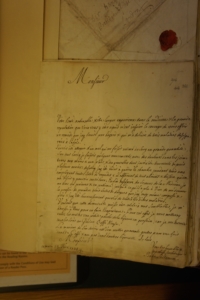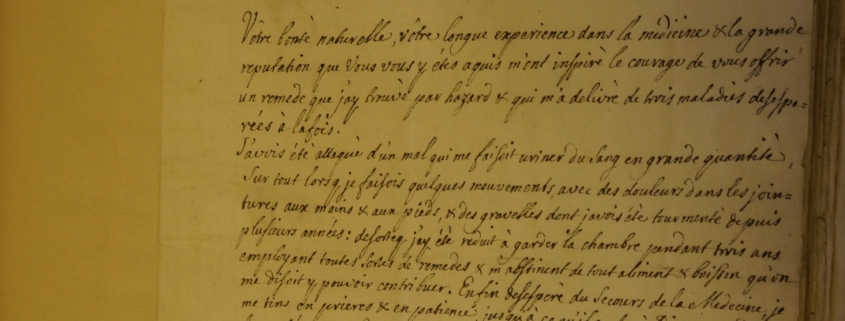Following the Spectral Presence of Baba
May 8, 2015
A couple of afternoons ago, I came across a tantalizing letter in French by a merchant from Julfa who has obsessed me since 2003, Coji Baba Sultanum of Captain Kidd fame. Baba was one of seven Armenian supercargoes on the ship Queddah Merchant that Captain Kidd plundered in 1698 on its return leg from Calcutta to Surat. He famously confronted the English pirate and offered him 20,000 rupees to set the ship free, but Kidd spurned the offer in what turned out to be a fateful decision that would cost him his life. Baba’s complaint to Aurangzebe’s court led Mughal authorities, in short order, to threaten the English East India Company officials in Surat with expulsion from Mughal domains and the latter to apply pressure on authorities back in London to bring Kidd to justice. When Kidd’s sentence of death by hanging was pronounced at Old Baileys in 1702, Coji Baba as well as the ship’s owner Agha Piri Calendar were present in the London courtroom having traveled there from Surat (India) to attend the trial.
Coja Baba Sultanum’s spectral presence, or the trace his life left in this world through odd references in archives across Europe and Asia, has obsessed me for over twelve years now. During this time, I have stumbled across Baba in Oxford (Bodleian manuscript collection has several items on his stay in London during the Kidd trial of circa 1700-1702), Amsterdam (where Baba was an active member of the Dutch-Armenian community and, according to Mkhitarist historian Alishan, was the principal patron of the city’s Armenian church of Spirito Santo or Surb Hogi built in 1714), Marseille and Paris (Baba was a witness in the trial of a well-known diamond merchant from Julfa known as Raphael de Ruply in the late 1670s) and Venice (where Baba appears as a principal witness in a case involving an Armenian Catholic priest whose papers from the Papal nuncio’s office in Marseille are stored in the Santa Croce archives in Venice, which I translated and transcribed last summer). In short, Baba Sultanum is and was everywhere. Two days ago, I photographed more than a dozen documents dispersed in different collections in the British Library. In a 1716 document, we find Baba here in London having just returned from India on an English East India Company ship with a consignment of garnets and Cornelian stones. It turns out that Baba was an agent (commenda factor) for the wealthy Catholic Armenian family of Sceriman/Shahrimanian, one of whose members Pietro Sceriman from Livorno had arrived in London that same year to claim Baba’s consignment of gems. The Company appears to have impounded them on account of Baba’s “bankruptcy” and inability to pay freight charges. As late as 1724/5, we find Baba still residing in London. He had probably cleared his name by then and appears to have moved in high society circles. A letter I found in a Sloane manuscript is reproduced below and indicates that he either knew Hans Sloane (1660-1753, 1st Baronet, Royal physician and president of the Royal Society, and collector of plants and manuscripts) or wished to meet him. Evidently Baba and Sloane used to frequent the same café in London, the Grecian Coffee House in Devereux Court where our merchant used to spend his evenings.
What follows is a literal transcription and translation of Baba’s letter to Sloane. Orthography and accents maintained as in original. I thank my friend Thiery for clarifying a few points regarding Baba’s passing of stones in this letter.
Monsieur
Vôtre bontè naturelle, vôtre longue experience dans la medicine & la grande reputation que vous vous y étes acquis m’ont inspirè le courage de vous offrir un remède que j’ay trouvè par hazard & qui m’a delivrè de trois maladies desesperées à la fois.
J’avois été attaquè d’un mal qui me faisait uriner du sang en grande quantitè sur tout lorsq je faisois quelques mouvements avec des douleurs dans les jointures aux mains & aux pieds, & des gravelles dont pavois été tourmente depuis plusiers années de sorte que j’ay été réduit a garder la chambre pendant trois ans employant toutes sortes de remèdes & m’abstinent de tout aliment & boisson qu’on me disoit y pouvoir contribuer. Enfin désespère du secours de la Médecine, je me tins en prieres & en patience, jusqu’à ce qu’il a plu a Dieu de me donner la pensée [?] de prendre trois sortes de drogues que j’ay moy meme composè & pris & j’ay été heureusement gueris de toutes les dites maladies.
Voulant que cette decouverte puisse être utiles à mes semblables, je m’adresse à vous pour en faire l’experience. Pour cet effet je vous metteray entre les mains une petite phiole de la liqueur en question, car je me trouve tous les soirs au Grecian Coffè House.
La manière de s’en servir est d’en mettre quarante goutes pour une fois dans du Caffe & non pas dans d’autres liqueurs. Je Suis Monsieur
Votre très humble & très obeis[ssant] Serviteur Baba Sultanum ce matin 23 Fevr. 1724/5

Letter of Coja Babajan di Sultanum to Sir Hans Sloane, in “Letters to Sir Hans Sloane” Sloan Ms. 4047, folio 321. Photo courtesy of the British Library
Your natural kindness, longtime experience in medicine, and the great reputation that you have acquired therein have inspired in me the courage to offer you a remedy that I came across rather accidentally and which has cured [me of] three desperate illnesses at once.
I had been attacked by an illness that made me urinate blood in large quantities above all when I made certain movements, with pain in the joints of my feet and hands, and kidney stones which had tormented me for several years, so that I was reduced to being confined to my room for three years, using all sorts of medications and abstaining from all food and drink that I was told could contribute to it [my pain]. Finally, having despaired of finding relief in medicine, I took to prayers and patience until it pleased God to give me the idea to take three kinds of drugs which I myself mixed and took, and I was fortunately cured of all the said illnesses. Wishing for this discovery to be more useful to my fellow sufferers, I am addressing myself to you so that you may try it out [the remedy]. For this purpose, I will place in your hands a small flask of the liquor in question, as I am to be found every evening at the Grecian Coffee House [in London].
The manner of using it is to put forty drops, all at once, in some coffee and not in any other liquor. I am ,sir,Your very humble and obedient servant,
Baba Sultanum
This morning, 23 February, 1724/5




